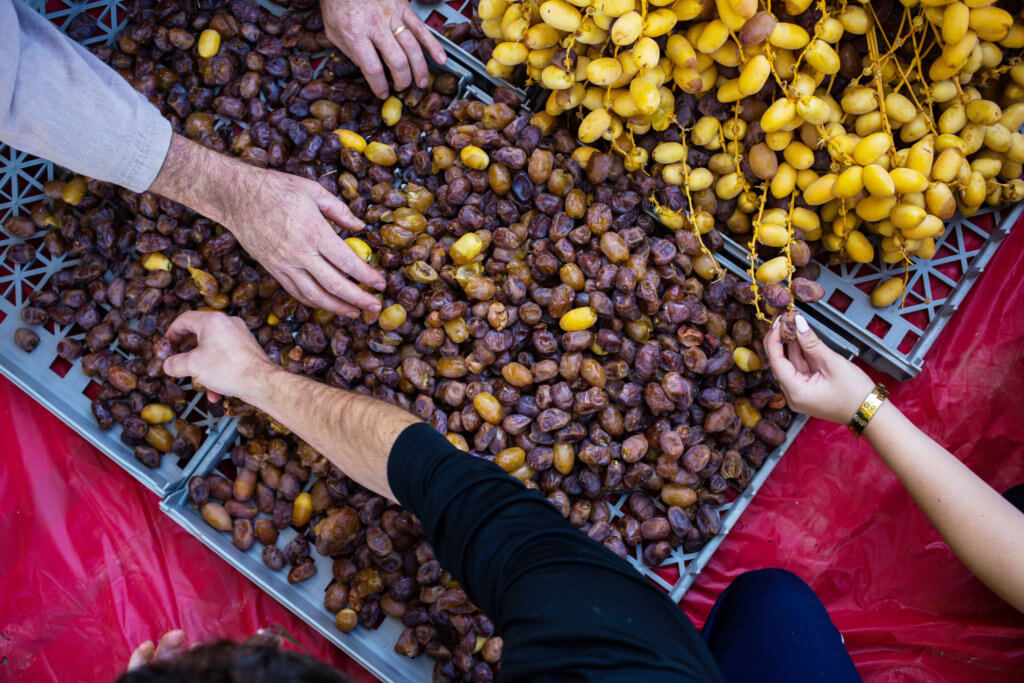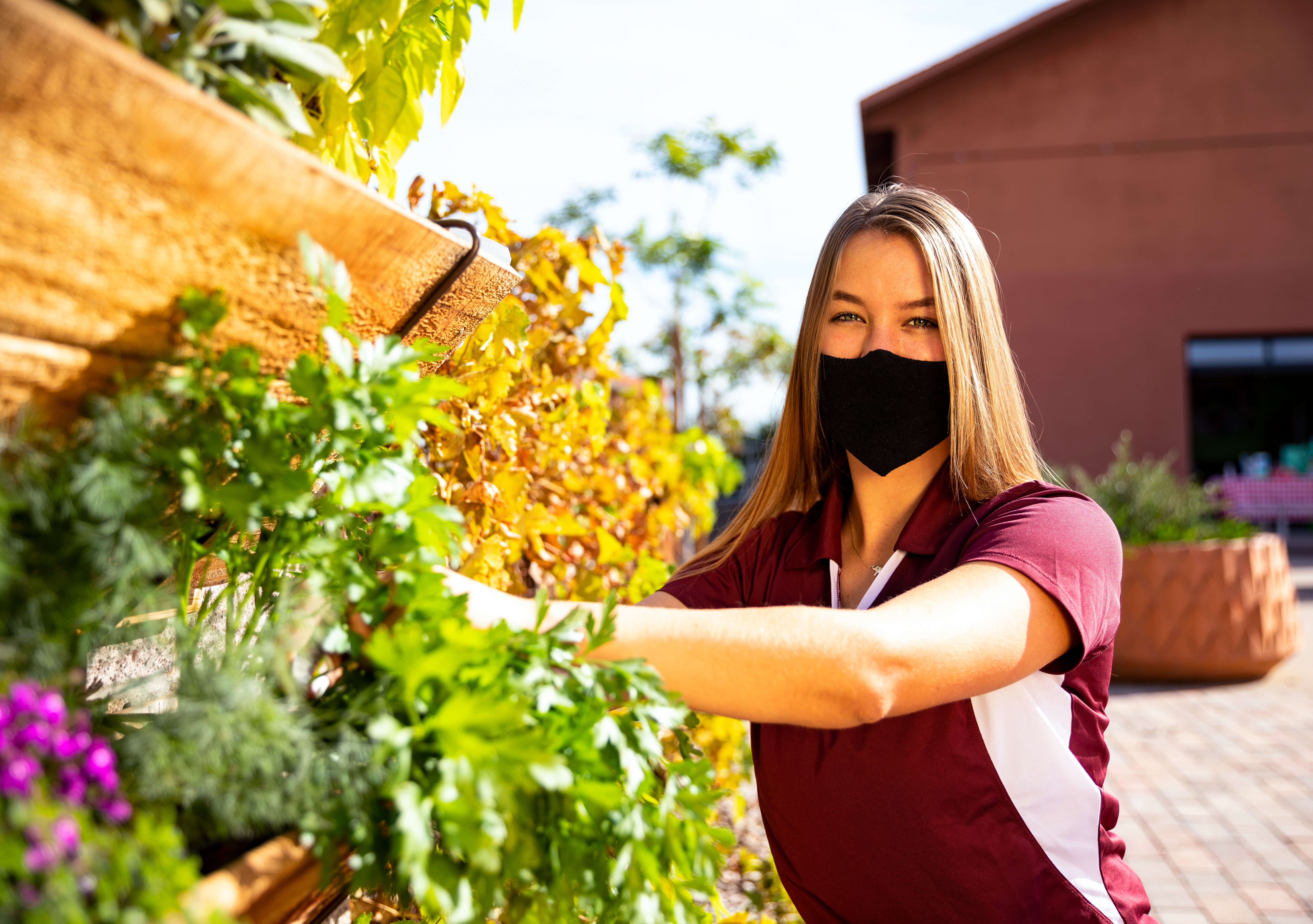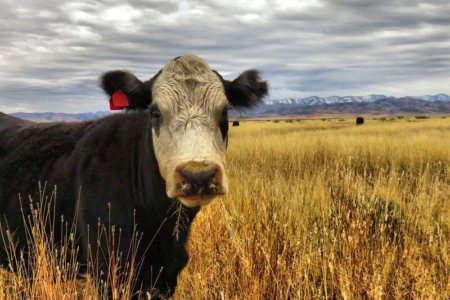When it comes to feeding the world, Arizona State University means business. Shannon Anderson knew that he had come to the right place to learn how to bring food from the farm to the global table from his first day at the Morrison School of Agribusiness when he learned the four P’s of marketing: product, price, placement, and promotion. He would go on to do these daily as a private label manager for Sprouts Farmer Market, before climbing the ranks to become a VP for Sales and Marketing at Ice Box Foods today.
“I select the product, I work on pricing strategies, I work on placement — how to get the product to the consumer in the best possible way — and I work on promotional planning,” he shares. “That’s basically, in a nutshell, what my job is; and I learned all of that on the first day at ASU — and it’s something I’m going to use for the rest of my life.”
Anderson is the kind of graduate the Morrison School develops: passionate, driven, and bright. Whether they are ensuring a safe, fresh food supply is available for consumers to purchase (the supply chain side) or motivating customers to buy produce (the marketing side), they are creating healthier, more holistic, and more sustainable food systems.
Experiential training is the ingredient that turns today’s ASU students into tomorrow’s impact-making experts in this dynamic field. This starts from the classroom itself.
With a BA in Global Agribusiness — the only programme in the world that is part of a top 30 ranked business school — students learn about agricultural production, economics, finance, marketing, and distribution as well as explore issues such as international trade, food safety, and sustainability. With a BA in Food Industry Management, students gain the skills and experience for careers in purchasing and procurement, food supply chain management, wholesale and distribution, logistics, commodity trading and export, and food marketing.
Industry engagement is extensive in most programmes at the Morrison School. From conventions to trips to Latin America, these real-world, applied learning experiences provide a set of skills and experiences distinctive to ASU graduates.
Mentoring and networking take place during events such as the intensive Produce Marketing Association (PMA) Career Pathways Program, where students attend customized seminars, panel discussions, and tours of food-industry companies. For years, students have also been attending the AgGateway Conference “Gateway to Ag Careers” which connects them to CIOs from companies like Syngenta, Pioneer, Monsanto, and Simplot.
At the National Grocers Association (NGA) Annual Show and Collegiate Case Competition, students get to walk the exposition floor with an industry mentor, attend educational seminars that cover current industry issues, and are provided a bird’s eye view of the retailing industry. Working in teams for the case competition, students develop and present their recommendations to a pressing industry problem posed by the NGA. For the Introduction to Agribusiness course, students also go on tours of local food and agribusiness enterprises such as the V & P Nursery, Whole Foods, Sibley’s West, and more.
During spring break, Morrison students have the option to head to Costa Rica. The highlight of this trip is examining the value chain of one of the country’s most important export commodities – coffee — and visiting the Starbucks experimental coffee farm, Hacienda Alsacia. They get to learn about coffee production from world-renowned coffee agronomist, Carlos Mario Rodriguez; see how its Farmer Support Centre facilitates the transfer of knowledge to coffee farmers in Costa Rica; plant a coffee tree on the farm; as well as meet officials from the US Embassy in Costa Rica, local Costa Rican government officials, and Starbucks VIPs.
“This isn’t boring, this is interactive,” says graduate AleQ Bateman, who is now Starbucks’s Communications Manager (Social Media). “I’ve been talking to people of different ages, from different countries, colleagues, and students who aren’t from Starbucks — just hearing how this has been a trip of self-discovery, how it’s changed their lives, and how they’re going to interact with coffee and people differently forever. I don’t think you can put a price on that.”
Such know-how and experience will bode well for those set to join this already bullish sector. Agribusiness accounts for over 50% of the global economy and employs one in four Americans. The food industry employs one in six people nationwide. In agriculture, there are more than 25,000 unfilled jobs across a range of roles every year.
As technology transforms the global food and agribusiness industry — impacting the workforce, markets, and the supply chain — Morrison graduates are prepared to stay ahead of the curve. How? Exposure to innovative and multi-faceted research by Morrison School faculty members. Their areas of research include food security, food availability, food access, food choice, food utilisation, food marketing, food safety, food loss and waste, sustainability, commodity analysis, risk management, labour supply, immigration, mechanisation, robotics, artificial intelligence, big data analytics, urban agriculture, and agricultural trade and policy. They pursue groundbreaking solutions; students prepare to follow in their footsteps.

Developing a marketing campaign for a state commodity is one of many projects ASU students get to work on. Source: Arizona State University
Excellent online, in-person and abroad
ASU’s online programmes are as dynamic as those on campus. Drew Sullivan worked at Sprouts as chief procurement officer for produce (nationally) while working towards his Morrison BA in Food Industry Management. He is now working at Amazon Fresh doing the same thing with meats.
“My degree allowed me to combine my work experience with an academic degree that allowed me to directly apply skills to my working profession,” he shares. “The level of involvement from the faculty in the programme was amazing; I was pleasantly surprised that even though I was an online student, I was still able to feel engaged and connected to the staff and faculty on campus. When I got to the core of Food Industry Management, I felt as though my degree helped me contribute to society in meaningful ways.”
Programmes are also delivered in-person at ASU’s Tempe, Polytechnic, and West campuses, where students have access to facilities such as the Agribusiness Centre. This 41,000 square foot building houses a consumer behaviour laboratory and accompanying test kitchen, the Kemper and Ethel Marley Foundation Lecture Hall, the Behavioural Economics and Policy Research Laboratory, the Food and Agribusiness Lab, and a number of fully-mediated classrooms and computer stations.
To learn more about how the Morrison School will prepare you to lead in this competitive, sophisticated, and global industry, click here. The ASU-AFMA Scholarship provides individual scholarships of up to $5,000 per semester to majors (both in-person and online) who are either currently working in the Arizona food industry or plan to pursue careers in the food industry upon graduation. The W. P. Carey School also offers general scholarships to eligible students; as well as departmental scholarships to students majoring in particular disciplines.
Follow Arizona State University on Facebook, Twitter, Instagram, and YouTube













